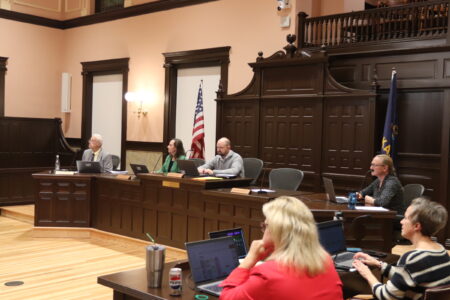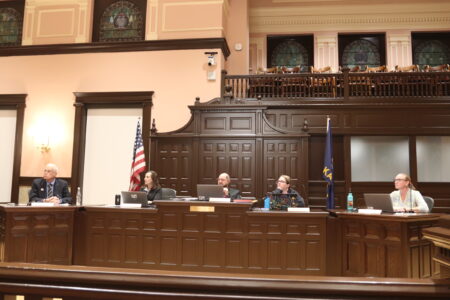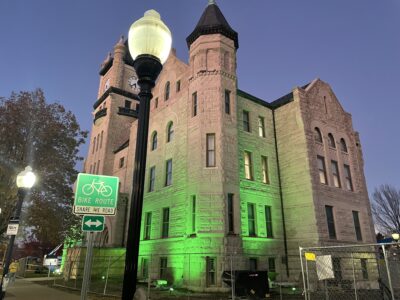Douglas County Commission hears from residents about expanding commission from 3 members to 5

photo by: Rochelle Valverde
County Clerk Jamie Shew gives a presentation as part of a listening session with the Douglas County Commission on Dec. 9, 2021.
Representation was a main issue among those who turned out Thursday for a listening session about whether the Douglas County Commission should expand from three members to five.
The commission tabled the topic this summer because few residents had expressed interest in the idea, but Commission Chair Shannon Portillo said that after media coverage of that decision, the commission heard from “quite a few folks.” That led the county to schedule Thursday’s listening session.
“Our goal today is to listen and to hear from the community,” Portillo said.
Portillo said that so far, representation had been one of the main issues, and that continued to hold true Thursday. About 20 people attended the event in person at the Douglas County Courthouse while others attended online via Zoom, and six people provided public comment. Those who commented spoke about representation and asked that the commission put the question to a public vote.
Ahead of public comment, County Clerk Jamie Shew gave a presentation on how a process for moving to a five-member commission would work and also clarified some questions regarding how districts are drawn.
The public discussion initially arose following the 2020 election, which resulted in a commission composed entirely of Lawrence residents for possibly the first time. George Hunsinger, public policy chair for the Douglas County Farm Bureau, said then that some rural residents worried that could mean the commission would be too focused on Lawrence issues.
Shew said the districts, which under state law must be compact, contiguous and equal in population, would be drawn based on the recently released U.S. Census data. He said Douglas County has a population of about 119,000, which includes about 95,000 people living in Lawrence, or about 80% of the county’s population.
He said he’d gotten questions about whether one district could consist of fewer people than the other districts and encompass Eudora and Baldwin City, and he said that would not be possible under state law. Shew said people had also asked whether a district could be made up of only unincorporated areas, and he said that is probably an option, although that would mean the other four districts would all be in Lawrence. Ultimately, he said the districts would reflect the fact that Lawrence is the main population center in the county.
“The key point is, all of the outlying districts outside of Lawrence equal about 24,000 (people), so that’s one district” on a five-member commission, Shew said.
Shew said there are a lot of different possibilities, and if voters approve an expansion of the commission, the county could put together a redistricting committee.
Shew said the commission could divide into three, five or seven districts. Under the current commission, each commissioner represents approximately 39,600 constituents. He said that’s close to how many constituents are represented by a seat in the Kansas Senate. A five-member commission would bring that number down to about 24,000, which he said would be comparable to a seat in the Kansas House.
Baldwin City Mayor Casey Simoneau told the commission that county residents desired better representation, and that he thought it was necessary to increase the commission to at least five members.
“I think as we look at Douglas County, our diversity that we see in Douglas County, our desire is to see that represented on our County Commission,” Simoneau said.
Steve Crane, a member of the Douglas County Farm Bureau board of directors, said that in addition to providing better representation, having five members would give the commission more ability to communicate outside of meetings without running afoul of the Kansas Open Meetings Act. Under KOMA, if a majority of a governing body — in the current commission’s case, two members — have a discussion that relates to their duties, it constitutes a meeting and that meeting must be open to the public.
Shew said increasing the number of districts would require a public election, which could be accomplished through a resolution passed by the commission or from a public petition. He said if voters approved such a measure, then new district maps would be established following the election. Once maps were approved, there would be an election for the new districts.







